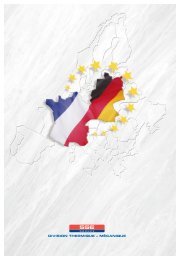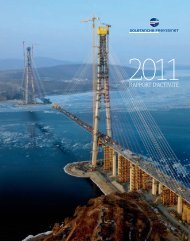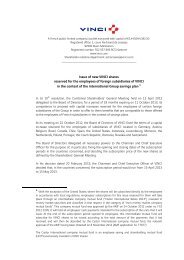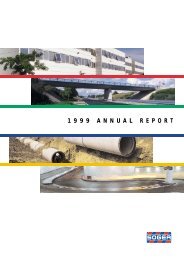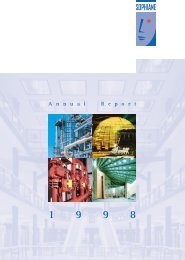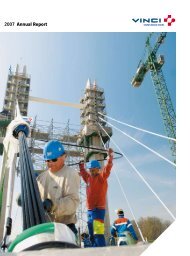ASF - 2002 annual report - Vinci
ASF - 2002 annual report - Vinci
ASF - 2002 annual report - Vinci
Create successful ePaper yourself
Turn your PDF publications into a flip-book with our unique Google optimized e-Paper software.
Environment and Sustainable Development<br />
be taken into account which<br />
and our policies<br />
standards to last, and with a concern<br />
for economical performance and<br />
cost control, are the reflection of a<br />
global approach by the <strong>ASF</strong> group.<br />
It is this integrated approach, from<br />
design to bringing into service, for<br />
which the panel of judges of the<br />
“Rubans d’Or <strong>2002</strong>” awarded a special<br />
prize for the A20 motorway between<br />
Cahors Nord and Souillac.<br />
In consultation with local players at<br />
the time of each construction site,<br />
the 1% landscape and development<br />
policy contributes to enhancing the<br />
territory of the communes which are<br />
located alongside the motorway, in<br />
terms of landscape, the economy<br />
and tourism. In <strong>2002</strong>, the charters for<br />
the routes of the A66 motorway in<br />
Haute-Garonne, the A87 in Vendée<br />
and the A89 in Puy-de-Dôme were<br />
completed.<br />
On the already existing motorways,<br />
the “Ecolisières” policy initiated by<br />
<strong>ASF</strong> follows the same logic of<br />
concerted development seeking to<br />
reconcile in the long term the necessities<br />
of the motorway with those of<br />
urban planning and the near environment.<br />
In this perspective, <strong>ASF</strong> supports<br />
the “town entrances” competition<br />
by the “Ligue Urbaine et Rurale”<br />
(town and country league) which<br />
recompenses towns which undertake<br />
to rehabilitate their dilapidated outskirts.<br />
An undisputed expertise in the<br />
“green” heritage<br />
Over the years the Group has set up<br />
and perpetuated an extremely rich<br />
vegetation heritage. Today more<br />
than 10,000 hectares of “vegetation<br />
areas” are looked after according to<br />
the “extensive management”<br />
method initiated by <strong>ASF</strong>: the<br />
consumption of fertilisers is very low<br />
in favour of the use of organic compost<br />
without any peat (recycling of<br />
organic matter, protection of peat<br />
bogs), the virtual abandon of plantcare<br />
products (weed-killers, insecticides,<br />
fungicides) in favour of mechanical<br />
interventions leading to the<br />
selection of the species of vegetation<br />
to be preserved, the creation of<br />
non-irrigated areas planted with species<br />
adapted to soils and climates to<br />
save water and not requiring much<br />
looking after. These areas have<br />
become havens sheltering an<br />
In <strong>2002</strong>, ESCOTA and the “Conservatoire<br />
des Etudes des Ecosystèmes<br />
de Provence” (Provence<br />
conservatory for the study of ecosystems)<br />
signed a framework<br />
agreement with the aim of reinforcing<br />
the remarkable preservation<br />
of the biological heritage on<br />
the land underlying the motorways.<br />
16-17




